Vaughn Entwistle's Blog, page 2
December 25, 2015
"Fun-tastic dialogue and more. Review of The Dead Assassin on the British Fantasy Society Web page
Newly-posted review of The Dead Assassin on the prestigious web site of the British Fantasy Society's web site.
Another fun review from the BFS's Phil Lunt. Phil reviewed the first book in the series, The Revenant of Thraxton Hall, and is a fan of the repartee between Conan Doyle and Oscar Wilde:
http://www.britishfantasysociety.org/reviews/the-dead-assassin-book-review/
Another fun review from the BFS's Phil Lunt. Phil reviewed the first book in the series, The Revenant of Thraxton Hall, and is a fan of the repartee between Conan Doyle and Oscar Wilde:
http://www.britishfantasysociety.org/reviews/the-dead-assassin-book-review/
Published on December 25, 2015 05:30
December 1, 2015
Read an excerpt from The Angel of Highate
Publication day! Yee-ha!
Click here to read an excerpt from the novel at Dread Central (love that name): The Angel of Highgate excerpt
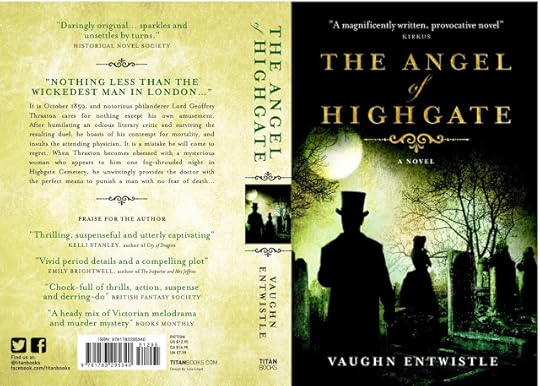
Click here to read an excerpt from the novel at Dread Central (love that name): The Angel of Highgate excerpt

Published on December 01, 2015 06:27
First Reviews Are In: The Angel of Highgate
First review of The Angel of Highgate is fabulous. Found this on the web site of Melanie, an Aussie-Book Blogger who now lives in the gothic splendour of Edinburgh.
Click to go to: Angel of Highgate Review
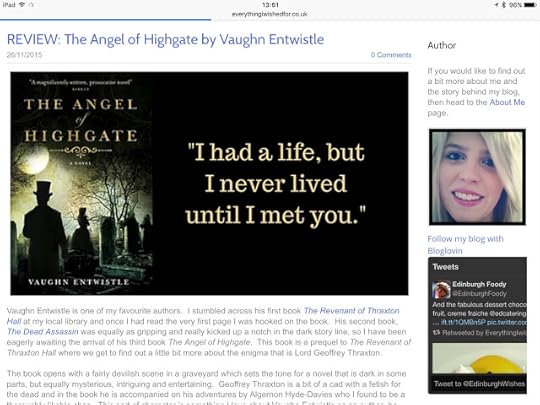
Click to go to: Angel of Highgate Review

Published on December 01, 2015 05:56
November 24, 2015
Last year I received a stellar review of The Revenan of T...
Last year I received a stellar review of The Revenan of Thraxton Hall from the quicky and wonderful web site, Fiction Reboot.
So this year I was a little nervous as to how the second book in the Paranormal Casebooks would be received--especially as I knew that it was being reviewed by a different reviewer.
Luckly, I need not have worried, as it received an even better review than the first book, thanks to the perspicacious reviewer with a very cool name: Hanna Clutterbuck-Cook! Thanks, Hanna!
Fiction Reboot Review: The Dead Assassin
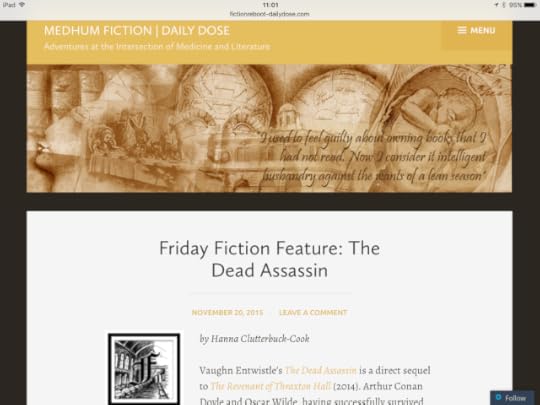
So this year I was a little nervous as to how the second book in the Paranormal Casebooks would be received--especially as I knew that it was being reviewed by a different reviewer.
Luckly, I need not have worried, as it received an even better review than the first book, thanks to the perspicacious reviewer with a very cool name: Hanna Clutterbuck-Cook! Thanks, Hanna!
Fiction Reboot Review: The Dead Assassin

Published on November 24, 2015 03:13
October 27, 2015
Fantasy Book Review Rates The Dead Assassin by Vaughn Entwistle
Terrific review of The Dead Assassin on the prestigious Fantasy Book Review website. Review Sandra Banks gave the book 8.5 out of 10 and Tweeted me that she is looking forward to the next book in the series.
Read the full review here:
Fantasy Book Review
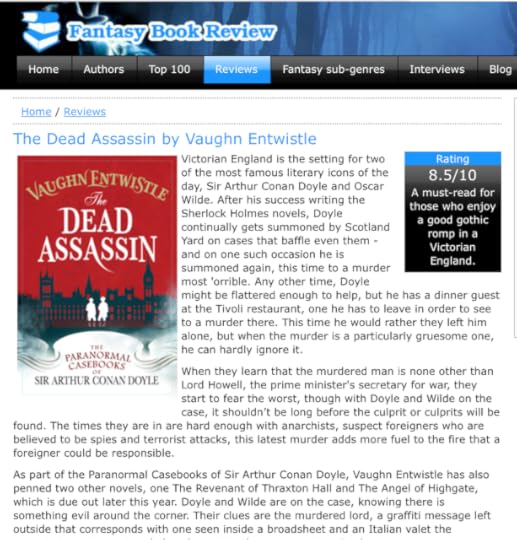
Read the full review here:
Fantasy Book Review

Published on October 27, 2015 07:05
October 22, 2015
Здравствуйте! (Hello!) To my new Russian Readers
From Russia with Love!
The Russian translation of The Revenant of Thraxton is on sale! At least one critic has already rated it as: Good.
Check it out in Russian or hit the Google translate button at this web address: Russian book seller site
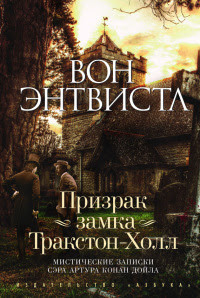
Very excited to see my name in cyrillic.(I need to have a t-shirt made). Love the cover, too, which features a gent in a top hat and a gent in a straw boater, no doubt meant to be Wilde and Conan Doyle. I figured the book had to be coming out soon as my web site has been getting hits from Moscow, St Petersburg and lots of other Russia cites!
I am thrilled to be published in a literate, arts-loving country like Russia, with its massive cultural heritage.
Celebrating with the best Russian vodka tonight!
Dasvidanya!
The Russian translation of The Revenant of Thraxton is on sale! At least one critic has already rated it as: Good.
Check it out in Russian or hit the Google translate button at this web address: Russian book seller site

Very excited to see my name in cyrillic.(I need to have a t-shirt made). Love the cover, too, which features a gent in a top hat and a gent in a straw boater, no doubt meant to be Wilde and Conan Doyle. I figured the book had to be coming out soon as my web site has been getting hits from Moscow, St Petersburg and lots of other Russia cites!
I am thrilled to be published in a literate, arts-loving country like Russia, with its massive cultural heritage.
Celebrating with the best Russian vodka tonight!
Dasvidanya!
Published on October 22, 2015 00:26
September 29, 2015
Just In: Gorgeous Front and Back Cover Art for The Angel of Highgate
You might have seen the cover, but now I have both the front, back and spine of my Victorian suspense novel, The Angel of Highgate. I have to give a big shout out to the designer Julia Lloyd for producing the best cover imaginable.
My editor, Miranda Jewess, also said that Titan is planning to use "soft-touch matte lamination and spot UV, so it'll be a stroke-able book."
Hmmn, sounds like a full-on sensual experience. Not entirely sure what a "stroke-able" book is. Think I'll leave that last comment as is. Here then, are the covers in all their glory. Love the colour palette:
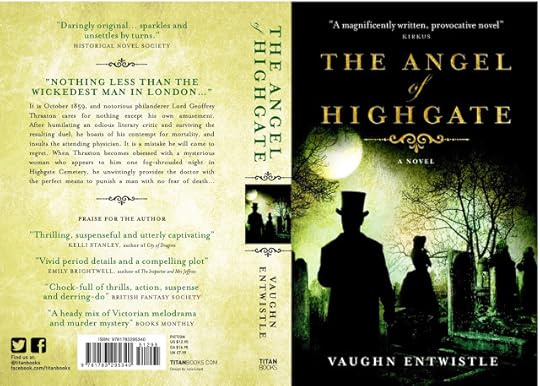
My editor, Miranda Jewess, also said that Titan is planning to use "soft-touch matte lamination and spot UV, so it'll be a stroke-able book."
Hmmn, sounds like a full-on sensual experience. Not entirely sure what a "stroke-able" book is. Think I'll leave that last comment as is. Here then, are the covers in all their glory. Love the colour palette:

Published on September 29, 2015 04:57
August 27, 2015
Another great review. This time from the Manhattan Book R...
Another great review. This time from the Manhattan Book Review, which somewhat confusingly, is based in California.
Manhattan Book Review
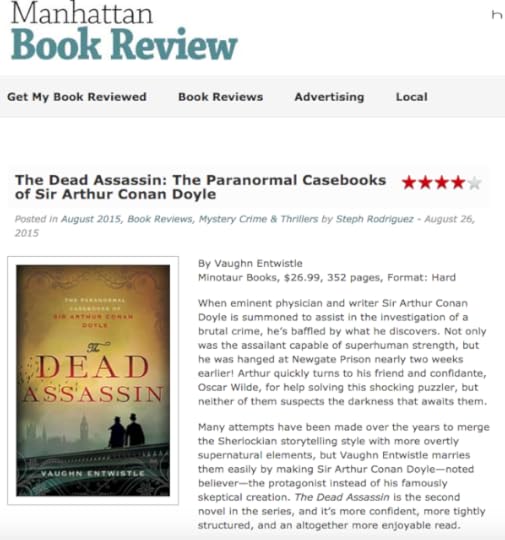
Manhattan Book Review

Published on August 27, 2015 23:55
August 25, 2015
A Shout Out from "The Crow's Nest!"
I never know when my books will be reviewed. Few reviewers send me an email to let me know. I have to resort to 'Google Advanced Search' to find them.
I've been busy lately, so I haven't been checking. But then I finally did and I'm glad I did.
The first was this very nice review on a UK science fiction site called 'SF Crows Nest.'
Check it out at: /SF Crow's Nest Review of The Dead Assassin
You might notice that the reviewer spelled my first name wrong. It should be Vaughn not Vaughan, but that's okay, so long as you give me a good review you can spell it how you like!
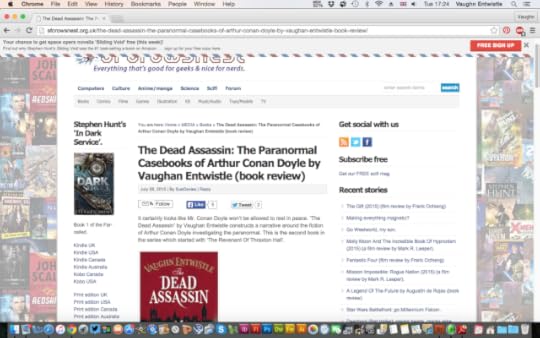
I've been busy lately, so I haven't been checking. But then I finally did and I'm glad I did.
The first was this very nice review on a UK science fiction site called 'SF Crows Nest.'
Check it out at: /SF Crow's Nest Review of The Dead Assassin
You might notice that the reviewer spelled my first name wrong. It should be Vaughn not Vaughan, but that's okay, so long as you give me a good review you can spell it how you like!

Published on August 25, 2015 09:26
July 22, 2015
Amazing Amazon Review from Mystery "Connoisseur" and critic, Laurence J. Coven
1 of 1 people found the following review helpful
5
These Ghosts May Apply and They're Hired--Hopefully for a good long seriesByLaurence J. Coven "Mystery connoisseur"on June 11, 2015Format: Hardcover
With the 2nd book in this Doyle (Holmes) series just coming out, (The Dead Assassin) I'm reminded of how much the first one surprised and delighted me. The Revenant of Thraxton Hall is to be the first book in a series called The Paranormal Casebooks of Sir Arthur Conan Doyle and that is excellent news indeed. Entwistle has set the bar high with this auspicious series debut.
It is 1893 London, and Arthur Conan Doyle (no “Sir” as yet), in his early thirties, experiences two of his life’s most profound and shocking moments. The first is by his own hand. He has just killed off Sherlock Holmes, the most beloved character in all literature. The second comes completely unsolicited and unexpectedly. An anonymous note imploring “the author of the Sherlock Holmes mysteries” to come to her on a matter of utmost gravity and urgency” arrives on his desk. The address given is unknown to Doyle. The summoner is unnamed. Doyle is only too used to people equating him with his creation and supposing that he has the same deductive and investigative skills as Holmes. Doyle hates all that. But it is a lady, so he goes.
The following day he is driven by his cabbie and left in front of a stunning, Mayfair mansion. The cab leaves before Doyle can bid him to wait. He approaches the door and sees the huge knocker, ornately decorated with a brass phoenix. He employs it and is greeted by a footman—a red-turbaned Sikh. Inside the mansion, it is cold and gloomy, with the odd “lingering tang of fish heads”. Entwistle proves he is a master of description and evocative ambience with many such turns of phrase.
The Sikh conducts Doyle into another room where he is told to wait. Suddenly, with no explanation, the door is slammed shut and locked behind him, and he is left in pitch dark. He must draw on all his strength and courage not to panic, and finally the lady, preceded by a haunting, seductive scent enters.
She is a psychic, a medium, and has foreseen her own murder at a future séance where she will be shot to death. The only other person in the vision is Doyle. She wants Doyle to find out who the murderer will be and save her. Doyle has perceived that she is a beautiful, very young woman. She even has a logical reason for the darkness. She suffers from porphyria, a rare, genetic affliction that causes any light to feel as daggers in the eyes. And although, at this point in his life, he is skeptical, but open-minded about the paranormal, still he gives no credence to her story. He tells her murder is for the police, not he. She importunes him. He is resolute. She leaves him, literally in the dark.
In one early scene Entwistle sets his stage for a most curious, singular, funny, and frightening tale. It expands constantly, but never flags or ceases to intrigue.
Doyle’s life is already in turmoil. Touie, his beloved wife is bed-ridden and dying of consumption. When the story “The Final Problem” hits the streets he instantly becomes the most hated man in London for killing Holmes. Insults, garbage, and rocks are hurled at him. His friend Oscar Wilde meets him for dinner and commiserates with Doyle in his own flamboyant manner. Wilde himself is getting in more and more trouble for his libertine ways. And all this is historically true, including the unlikely friendship of Wilde and Doyle. Their personalities couldn’t be more different, but they were the greatest and most celebrated literary geniuses of their time in England, and they respect each other’s work and talent and were genuinely fond of each other.
Entwistle’s sharp sense of the comic is manifested when Doyle meets with his editor, H.G. Smith, at The Strand, which has become fabulously successful largely because of the Holmes stories. When Doyle opines that he has become the most reviled and hated man in London, Wells replies, “I think you underestimate public sentiment, Arthur. You would have been more popular if you had beaten the prime minister to death with a puppy…”
Doyle determines to return to the psychic’s home, and Wilde wheedles his way into an adventure which he finds delightfully bizarre.
But the house is empty. Apparently the lady and the Sikh have gone away. Perhaps, Wilde suggests, to some estate in the country, but when Doyle points out that the huge ornate door-knocker is gone, Wilde’s riposte is “That does seem like excessive over packing.” Entwistle continually supplies Wilde with raucously humorous bon-mots, and although he completely peppers Wilde’s dialogue with them, and some may be just sort of ok-mots, still they are very clever, and often wildly funny (OK—pun intended.) But Wilde is far from just a witticism on legs. Entwistle has given him character, heart and intelligence.
Doyle receives another somewhat mysterious note inviting him to the inaugural meeting of the Society for Psychical Research, which is being held at Thraxton Hall, whose mistress is Lady Hope Thraxton, the very lady who had enlisted Doyle’s help to prevent her future but foreseen murder.
Doyle’s unsure about going. Touie is very unwell, and he has just given her laudanum, and for once, taken some himself. In a state of muddled mind and deep sadness, a figure suddenly bursts out of a Paget illustration on the wall. That figure is, of course, Sherlock Holmes who takes a seat in a comfy armchair, lights his pipe and proceeds to tell his creator to drop his self-pity and that “the game’s afoot.”
But Doyle has just taken laudanum, so is Holmes really there or is he hallucinating. Entwistle keeps the reader off balance all the time. Are seemingly inexplicable things really explainable in a rational way?
At the psychic convention there are bizarre characters everywhere—I mean serious loons—but loons which may or may not have credibility. Levitators, palm-readers, teletransporters, and mesmerists litter the landscape. An inexplicable Count who always wears a mask, a dapper debonair, arrogant Lord who is not what he seems, if only we at least were sure what it was he seems to be, an ancient Russian crone, Madame Zhozhovsky, who has seen past the vale, travelled through the Himalayas, and apparently ran a biscuit shop somewhere in Manchester. She also always carries around with her a most unpleasant monkey. And then there’s the much, much older butler, Greaves, who is blind and has serves the Thraxtons for generations. He could be anywhere from exceedingly evil to the most generous and kind fellow at this gathering. At one point he pulls off an Irene Adler moment to perfection. Just trust me, he does it. And the cast list goes on from there.
But the most overpowering presence is Thraxton Hall itself. A crumbling monstrosity that has more curses than Hostess has cupcakes. It also appears to be a tesseract—larger on the inside than on the outside. It is more haunted than Manderley from Rebecca and twice as menacing as anything they every built in Amityville.
But then there’s Lady Hope, herself, a beautiful, young, sensitive woman who Doyle is there to save. Surely he can keep his eye on that prize. Except suddenly she becomes a siren, tempting Doyle into unfaithfulness, and leading him on tours of horror around the house—the crypt which houses all the coffins of all the generations of Thraxtons, some so old they have decayed and spilled their unholy detritus over the unwelcoming ground. And she takes him to the secret mirror room where uncounted numbers of them restlessly abide and reflect. But there are no mirrors anywhere else in the house. Don’t worry. No vampires. But we do learn that reflections live forever, especially if one has a “scrying” mirror, which Hope Thraxton’s ancestor, Mariah, holds in her hand in her huge dusty portrait in the hall. And Mariah is the spirit guide that possesses Hope during the séances. And these séances are very powerfully described. They are scary and wonderfully creepy. And she doesn’t even need to spin her head all the way around and spew out pea soup.
Through all these chilling and dizzying convolutions, Doyle and Wilde must somehow solve a murder before it happens. Wilde at one point reminds Doyle he is a man of the theater, and that’s what he sees here—incredible theater. But as things become more inexplicable and frightening they drive Wilde to his absinthe and Doyle back to his visions of Holmes.
But Wilde in one of his not uncommon perceptive moments, when Doyle is compiling a list of the most likely suspects, points out, that Arthur should put himself on the list. Doyle emphatically denies that possibility; he is here to save the lady. But Doyle is taken aback when Wilde cogently observes that one person they know for sure who carries a hidden gun is Arthur himself, for Conan Doyle has indeed brought his service revolver with him. (Good Old Watson!)
Well what to believe and what not to? Is it spooks or charlatans who rule the day, or some combination thereof? Holmes once said “The world is wide enough. No ghosts need apply”. But then Doyle is not Holmes, as he keeps trying to convince the world and himself.
And there is a murder to be solved here, and a culprit to be brought to justice, or so we are foretold. Doyle and Wilde must bring all their considerable intelligence, powers of observation, common sense, and courage to this pretty little problem. And they complement each other’s strengths perfectly, each filling in what the other lacks. They must prepare themselves for the worst, whatever it maybe.
Fortunately all the reader has to do is snuggle down in the comforter, turn on his reading light, and have one hell of a good time.
With the 2nd book in this Doyle (Holmes) series just coming out, (The Dead Assassin) I'm reminded of how much the first one surprised and delighted me. The Revenant of Thraxton Hall is to be the first book in a series called The Paranormal Casebooks of Sir Arthur Conan Doyle and that is excellent news indeed. Entwistle has set the bar high with this auspicious series debut.
It is 1893 London, and Arthur Conan Doyle (no “Sir” as yet), in his early thirties, experiences two of his life’s most profound and shocking moments. The first is by his own hand. He has just killed off Sherlock Holmes, the most beloved character in all literature. The second comes completely unsolicited and unexpectedly. An anonymous note imploring “the author of the Sherlock Holmes mysteries” to come to her on a matter of utmost gravity and urgency” arrives on his desk. The address given is unknown to Doyle. The summoner is unnamed. Doyle is only too used to people equating him with his creation and supposing that he has the same deductive and investigative skills as Holmes. Doyle hates all that. But it is a lady, so he goes.
The following day he is driven by his cabbie and left in front of a stunning, Mayfair mansion. The cab leaves before Doyle can bid him to wait. He approaches the door and sees the huge knocker, ornately decorated with a brass phoenix. He employs it and is greeted by a footman—a red-turbaned Sikh. Inside the mansion, it is cold and gloomy, with the odd “lingering tang of fish heads”. Entwistle proves he is a master of description and evocative ambience with many such turns of phrase.
The Sikh conducts Doyle into another room where he is told to wait. Suddenly, with no explanation, the door is slammed shut and locked behind him, and he is left in pitch dark. He must draw on all his strength and courage not to panic, and finally the lady, preceded by a haunting, seductive scent enters.
She is a psychic, a medium, and has foreseen her own murder at a future séance where she will be shot to death. The only other person in the vision is Doyle. She wants Doyle to find out who the murderer will be and save her. Doyle has perceived that she is a beautiful, very young woman. She even has a logical reason for the darkness. She suffers from porphyria, a rare, genetic affliction that causes any light to feel as daggers in the eyes. And although, at this point in his life, he is skeptical, but open-minded about the paranormal, still he gives no credence to her story. He tells her murder is for the police, not he. She importunes him. He is resolute. She leaves him, literally in the dark.
In one early scene Entwistle sets his stage for a most curious, singular, funny, and frightening tale. It expands constantly, but never flags or ceases to intrigue.
Doyle’s life is already in turmoil. Touie, his beloved wife is bed-ridden and dying of consumption. When the story “The Final Problem” hits the streets he instantly becomes the most hated man in London for killing Holmes. Insults, garbage, and rocks are hurled at him. His friend Oscar Wilde meets him for dinner and commiserates with Doyle in his own flamboyant manner. Wilde himself is getting in more and more trouble for his libertine ways. And all this is historically true, including the unlikely friendship of Wilde and Doyle. Their personalities couldn’t be more different, but they were the greatest and most celebrated literary geniuses of their time in England, and they respect each other’s work and talent and were genuinely fond of each other.
Entwistle’s sharp sense of the comic is manifested when Doyle meets with his editor, H.G. Smith, at The Strand, which has become fabulously successful largely because of the Holmes stories. When Doyle opines that he has become the most reviled and hated man in London, Wells replies, “I think you underestimate public sentiment, Arthur. You would have been more popular if you had beaten the prime minister to death with a puppy…”
Doyle determines to return to the psychic’s home, and Wilde wheedles his way into an adventure which he finds delightfully bizarre.
But the house is empty. Apparently the lady and the Sikh have gone away. Perhaps, Wilde suggests, to some estate in the country, but when Doyle points out that the huge ornate door-knocker is gone, Wilde’s riposte is “That does seem like excessive over packing.” Entwistle continually supplies Wilde with raucously humorous bon-mots, and although he completely peppers Wilde’s dialogue with them, and some may be just sort of ok-mots, still they are very clever, and often wildly funny (OK—pun intended.) But Wilde is far from just a witticism on legs. Entwistle has given him character, heart and intelligence.
Doyle receives another somewhat mysterious note inviting him to the inaugural meeting of the Society for Psychical Research, which is being held at Thraxton Hall, whose mistress is Lady Hope Thraxton, the very lady who had enlisted Doyle’s help to prevent her future but foreseen murder.
Doyle’s unsure about going. Touie is very unwell, and he has just given her laudanum, and for once, taken some himself. In a state of muddled mind and deep sadness, a figure suddenly bursts out of a Paget illustration on the wall. That figure is, of course, Sherlock Holmes who takes a seat in a comfy armchair, lights his pipe and proceeds to tell his creator to drop his self-pity and that “the game’s afoot.”
But Doyle has just taken laudanum, so is Holmes really there or is he hallucinating. Entwistle keeps the reader off balance all the time. Are seemingly inexplicable things really explainable in a rational way?
At the psychic convention there are bizarre characters everywhere—I mean serious loons—but loons which may or may not have credibility. Levitators, palm-readers, teletransporters, and mesmerists litter the landscape. An inexplicable Count who always wears a mask, a dapper debonair, arrogant Lord who is not what he seems, if only we at least were sure what it was he seems to be, an ancient Russian crone, Madame Zhozhovsky, who has seen past the vale, travelled through the Himalayas, and apparently ran a biscuit shop somewhere in Manchester. She also always carries around with her a most unpleasant monkey. And then there’s the much, much older butler, Greaves, who is blind and has serves the Thraxtons for generations. He could be anywhere from exceedingly evil to the most generous and kind fellow at this gathering. At one point he pulls off an Irene Adler moment to perfection. Just trust me, he does it. And the cast list goes on from there.
But the most overpowering presence is Thraxton Hall itself. A crumbling monstrosity that has more curses than Hostess has cupcakes. It also appears to be a tesseract—larger on the inside than on the outside. It is more haunted than Manderley from Rebecca and twice as menacing as anything they every built in Amityville.
But then there’s Lady Hope, herself, a beautiful, young, sensitive woman who Doyle is there to save. Surely he can keep his eye on that prize. Except suddenly she becomes a siren, tempting Doyle into unfaithfulness, and leading him on tours of horror around the house—the crypt which houses all the coffins of all the generations of Thraxtons, some so old they have decayed and spilled their unholy detritus over the unwelcoming ground. And she takes him to the secret mirror room where uncounted numbers of them restlessly abide and reflect. But there are no mirrors anywhere else in the house. Don’t worry. No vampires. But we do learn that reflections live forever, especially if one has a “scrying” mirror, which Hope Thraxton’s ancestor, Mariah, holds in her hand in her huge dusty portrait in the hall. And Mariah is the spirit guide that possesses Hope during the séances. And these séances are very powerfully described. They are scary and wonderfully creepy. And she doesn’t even need to spin her head all the way around and spew out pea soup.
Through all these chilling and dizzying convolutions, Doyle and Wilde must somehow solve a murder before it happens. Wilde at one point reminds Doyle he is a man of the theater, and that’s what he sees here—incredible theater. But as things become more inexplicable and frightening they drive Wilde to his absinthe and Doyle back to his visions of Holmes.
But Wilde in one of his not uncommon perceptive moments, when Doyle is compiling a list of the most likely suspects, points out, that Arthur should put himself on the list. Doyle emphatically denies that possibility; he is here to save the lady. But Doyle is taken aback when Wilde cogently observes that one person they know for sure who carries a hidden gun is Arthur himself, for Conan Doyle has indeed brought his service revolver with him. (Good Old Watson!)
Well what to believe and what not to? Is it spooks or charlatans who rule the day, or some combination thereof? Holmes once said “The world is wide enough. No ghosts need apply”. But then Doyle is not Holmes, as he keeps trying to convince the world and himself.
And there is a murder to be solved here, and a culprit to be brought to justice, or so we are foretold. Doyle and Wilde must bring all their considerable intelligence, powers of observation, common sense, and courage to this pretty little problem. And they complement each other’s strengths perfectly, each filling in what the other lacks. They must prepare themselves for the worst, whatever it maybe.
Fortunately all the reader has to do is snuggle down in the comforter, turn on his reading light, and have one hell of a good time.
Published on July 22, 2015 06:44



